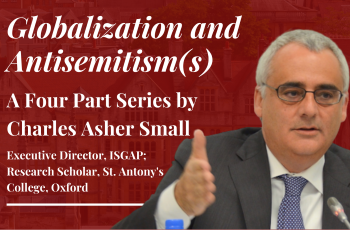This four-part course offers a critical analysis of issues central to the study and emergence of contemporary antisemitism, as it relates to processes of globalization, the crisis of modernity, and the rise of reactionary anti-systemic movements, including political Islam, the extreme left, and extreme right-wing nationalism. This area of inquiry is central to challenges confronting scholars and students when assessing the complexities of contemporary antisemitism(s) in a comprehensive analytical manner.
Attention is placed on notions of contemporary forms of antisemitism(s) in the framework of how political, socio-economic, political and cultural forms are affected by processes of globalization, in relation to marginalization, the emergence of social movements that attack the democratic center, as a response to the crisis of modernity. Themes to be explored include analysis, in relation to issues of power, the construction of identity (nationality, race, ethnicity, gender, community, notions of ‘Otherness’, migration); as well as social and protest movements. The course will examine contemporary antisemitism within a conceptual and empirical framework.

